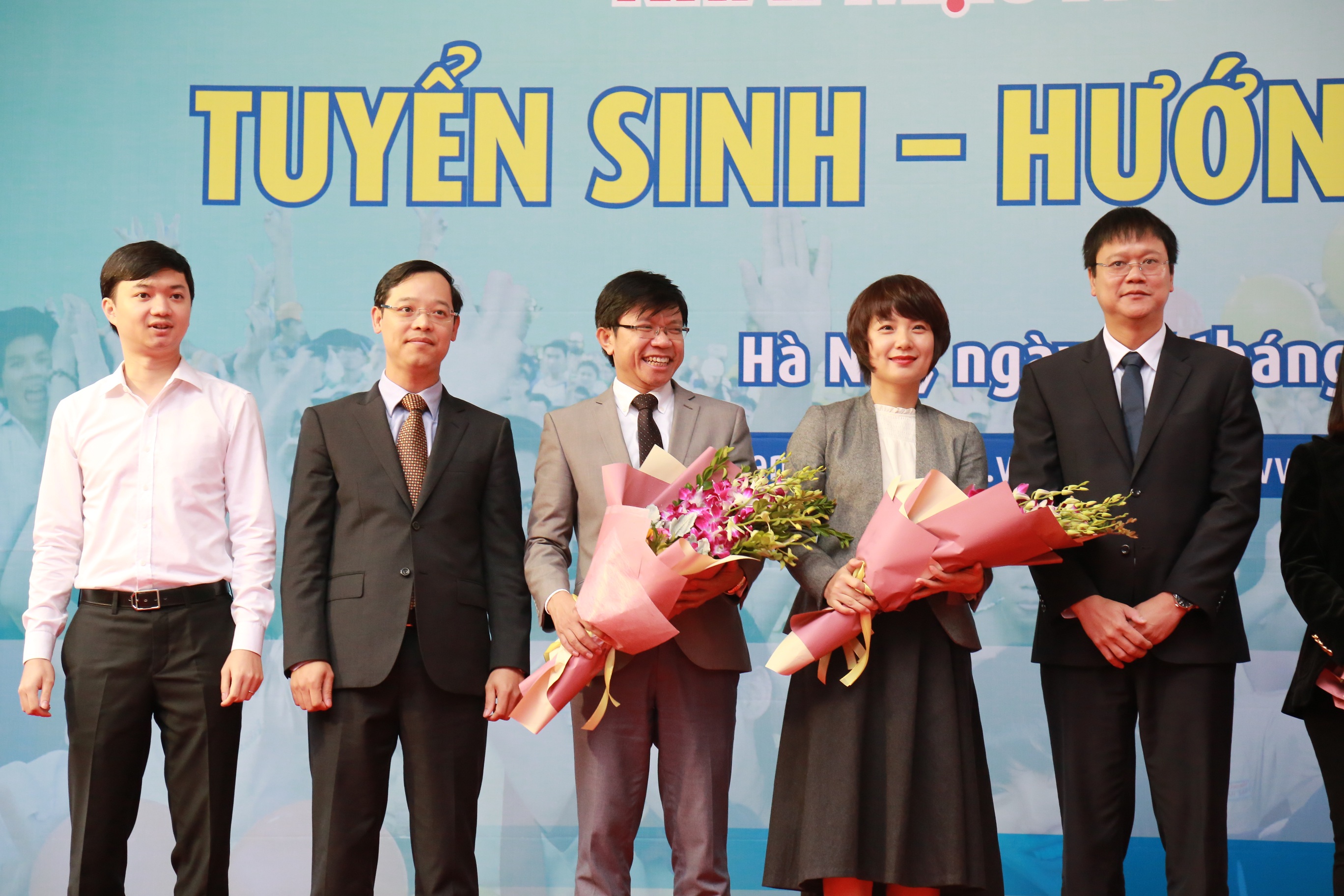

Associate Professor Dr. Hoang Anh Tuan - Vice Rector of the University of Social Sciences and Humanities, VNU at the 2019 Admissions Consulting Day at the University of Science and Technology, Hanoi (March 2019)
Vice Rector of University of Social Sciences and Humanities: Choosing a major is like choosing a life partner
Many candidates have compared changing their registration wishes to a second National High School Exam full of stress and pressure. Even when schools provide floor scores and predicted benchmark scores, many students are still confused about how to choose based on that?
In charge of the school's admissions, Associate Professor Dr. Hoang Anh Tuan, Vice Principal of the University of Social Sciences and Humanities, Vietnam National University, Hanoi, gave 3 notes for candidates when changing their wishes as follows:
First, let's look at the score distribution of schools in 2018. As for the University of Social Sciences and Humanities, the target is still the same as in 2018, the number of applications registered up to this point is almost the same as in 2018.
Second, you have to look at your score to consider. If your score is too close to the minimum score, you should be careful, especially when it is a "hot" major with a high competition rate, because the standard score will be taken from high to low.
Third, you need to be alert to reserve NV2 and NV3 based on understanding the major you are applying for. For example, suppose you like Public Relations (QHCC). But the QHCC score is usually higher than Management Science. While in reality, these two majors are very close in terms of job characteristics. Therefore, if you see that QHCC scores up to 26, while Management Science only scores 22, 23, then reserve your second choice.

Or if you see that the QHCC in Social Sciences and Humanities is higher than the QHCC in a certain school, then you should drop your first choice to Social Sciences and Humanities. Suppose you unfortunately miss 1 point in NV1, you can still pass NV2 and 3.
And most importantly, you must like the major you apply for. Don't apply just to get into university.
Because studying is not only your time and effort, but also your parents’ money, and a waste of society’s human resources. If you don’t like it, you still try to study, you can’t get good results. After graduating, it will be the same if you don’t have enough passion and enthusiasm for work.
“You may not understand at the age of 17 or 18, but I still want to tell you that choosing a career is like life. When choosing someone to marry, you also need love, life will be harmonious and happy. Or as billionaire Zack Ma shared, the important thing is not to study at a big school, but to study the major you like. Also, don't focus on working at a big company, but choose good bosses. Thinking about it, it's very true in life," Associate Professor Dr. Hoang Anh Tuan shared.

Vice Principal of Hanoi University of Science and Technology: Choose your favorite major first
Sharing the same opinion with Associate Professor Dr. Hoang Anh Tuan, Associate Professor Dr. Tran Van Top, Vice Principal of the University of Technology, shared: “If I had any advice for students, I would advise them to first choose a major they love. Only when they love it can they nurture their passion, have the motivation and determination to study later.”
However, according to Associate Professor Dr. Tran Van Top, if you do not meet the admission score for your favorite major, you must measure your strength. And one of the important data for students to rely on when changing their wishes is the predicted admission score of the schools.
As for Hanoi University of Science and Technology, there are quite in-depth forecasts for each industry. And to have this prediction, the University must rely on the foundations.
First, is through analyzing the score distribution of the years. For example, the score distribution in 2017 was higher than in 2018. This affected the benchmark scores of the majors. For example, the Information Technology major of the University of Science and Technology in 2017 took 28.25 points. But in 2018 it was 25.35 points.
For 2019, through analysis of all data, it shows that the score of each subject has increased compared to last year. And when the score of each subject increases by 0.5 - 1 point, when considering a combination, the score can increase by 1.5 - 3 points.
Second, based on the admission experience, admission scores of previous school years, especially career trends. There are “hot” majors that attract many applications.
For example, the number of candidates applying for the Computer Science major that the School predicts to score 27-28 points is very large, NV1 is already 2,600 students. While the quota is only 280, and the direct admission students alone are 60 students. If the quota decreases, of course the predicted standard score will increase.
If the predicted score is around 22, 23, 24, students will rush in, with 4,000 - 5,000 students applying. If they don't get in, it will be a loss for the students.
“The prediction should be as close to the benchmark as possible. However, no one dares to say that they give an exact number. Last year when we made the prediction, many people, including candidates, said that BK was “flirting”. But the results showed that BK’s predictions were quite accurate. The predictions were not baseless but very responsible,” Mr. Top said.
According to the Vice Principal of the University of Technology, predicting benchmark scores also helps candidates know the trend and change their career to suit their scores.
For example, the Electricity industry, for about 4 years the electricity industry did not recruit human resources. But now, Vietnam Electricity Group has started recruiting again, it will impact the market.
Or the Mining and Petrochemical industry, in recent years there have been major changes, affecting schools that train in this industry, including Hanoi University of Science and Technology.
You shouldn't focus all your efforts on "hot" industries. After 5-7 years when you graduate, technology trends and human resource needs may change, making it difficult to find a job.
Thus, schools must see future forecasts, and students themselves must also learn and consider.
“I am really jealous of young people today. When I was a student, no one gave me advice. There was no information, I just heard from rumors. Now, all schools have very complete advice, predicted benchmark scores... students should refer to them. And it is best to go to counseling programs to get support from teachers,” Associate Professor, Dr. Tran Van Top.
According to khoahocdoisong.vn
Author:Mai Loan
Newer news
Older news